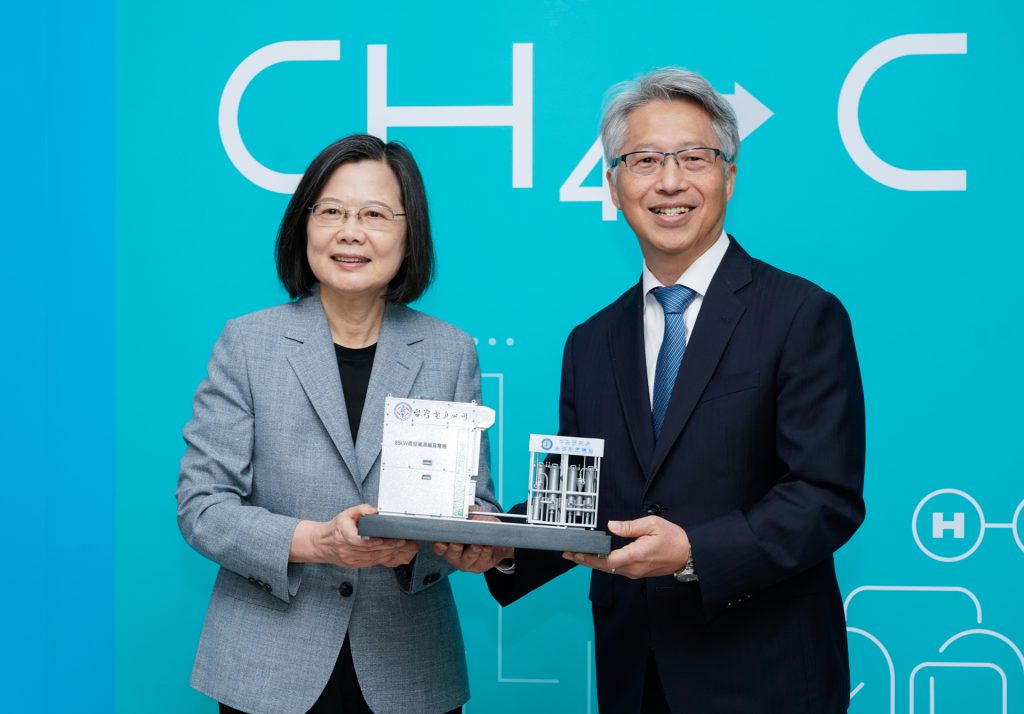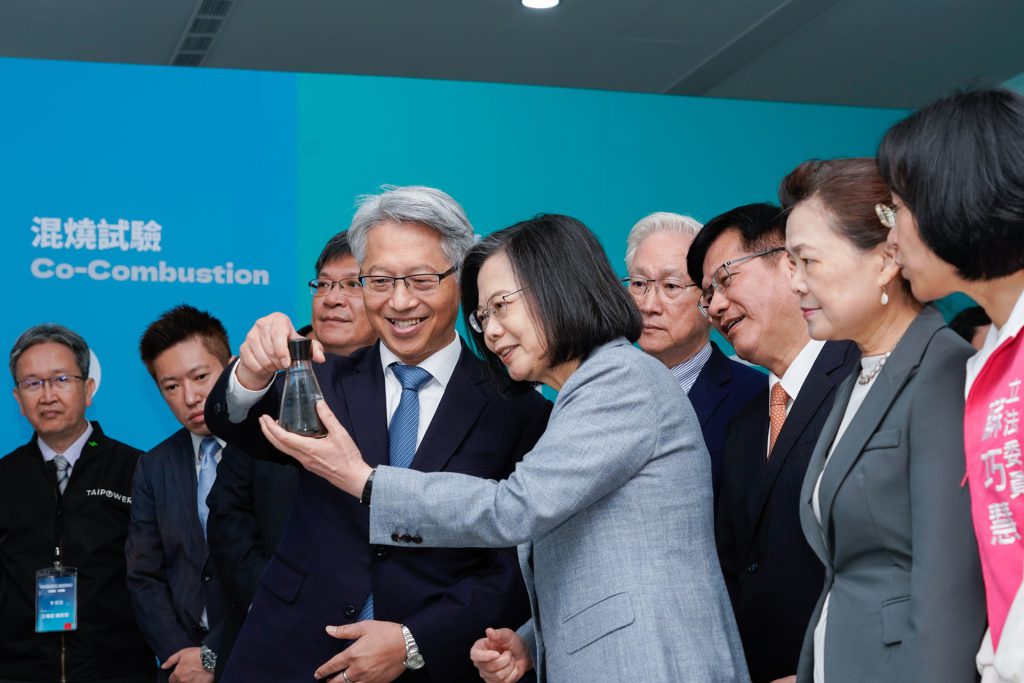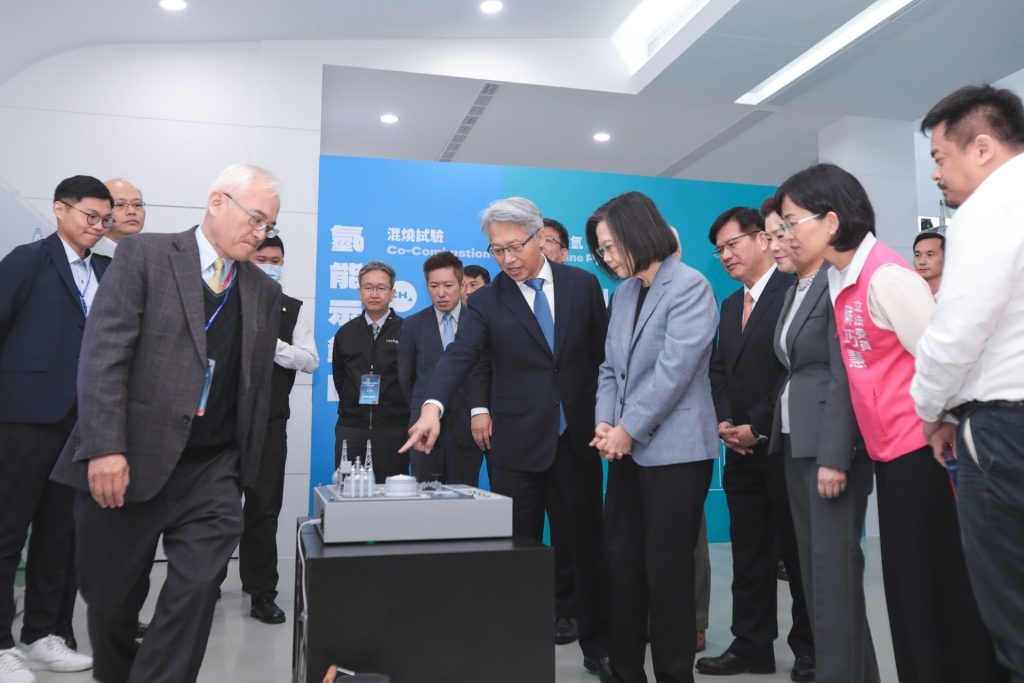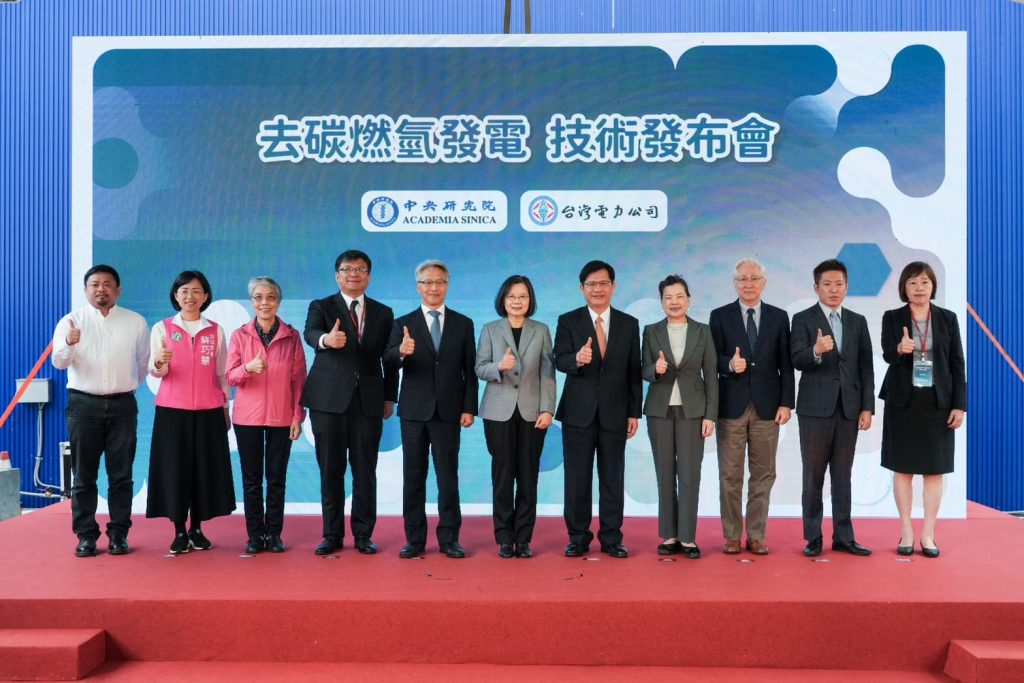To reach the goal of net-zero emissions by 2050, on November 14, Academia Sinica and the Taiwan Power Company (Taipower) held a technology conference on methane pyrolysis power generation at the Taiwan Power Research Institute (TPRI). Emerging from the laboratories of Academia Sinica, methane pyrolysis technology has recently been successfully applied in Taipower’s small-scale power generation units! President Ing-Wen Tsai attended the conference to deliver a speech, and together with Academia Sinica President Liao and other dignitaries, witnessed the significant milestone of net-zero emissions.

According to President Liao, in the face of the great challenges of global carbon reduction and energy transition, the methane pyrolysis technology provides a new technological option that can pyrolyze natural gas, remove its “carbon,” and burn only the “hydrogen” to create zero-carbon electricity. Two years ago, Academia Sinica actively researched and developed this technology, and the collaboration with Taipower demonstrates that this technology can be integrated with existing power generation systems, and is proven successful in vertically integrating research and application. Methane pyrolysis eliminates the need to capture and store carbon dioxide after natural gas power generation, which will greatly benefit Taiwan and the other countries in reducing carbon emissions of natural gas power generation.
President Tsai recognized the results of this R&D, saying that net-zero emissions is a world-wide goal, including Taiwan. In last year’s “Taiwan’s Pathway to Net-Zero Emissions in 2050,” by the National Development Council (NDC), “Technology R&D” is one of the foundations of energy transition. The combination of technologies from both Academia Sinica and Taipower has allowed us to take another big step forward in reducing carbon emissions and combating global warming.
Yue-Gau Chen, Executive Secretary of the Center for Sustainability Science at Academia Sinica, explained that after a thorough consideration of various zero-carbon energy technology options, Academia Sinica has developed its own “methane pyrolysis” power generation technology to meet Taiwan’s carbon-reduction needs. This technology has five major advantages:
1.Utilizing less energy. Pyrolyzing natural gas to produce hydrogen requires only one-seventh of the energy of water electrolysis.
2.Avoiding problems of transportation and storage of hydrogen. Methane pyrolysis facilities can be built into power plants to generate electricity on-site, avoiding the problems associated with the storage and transportation of hydrogen.
3.Creating low-carbon electricity in the near future. By increasing the conversion rate of decarbonization and the ratio of hydrogen blending, the future power generation can gradually realize the zero-carbon vision.
4.Amplifying zero-carbon electricity. If methane pyrolysis power generation is supplied by the electricity generated from renewable energy sources, it will have three times compounding effect on the zero-carbon electricity production, amplifying the benefits of green power tremendously.
5.Providing backup energy and industrial materials. The high-quality carbon obtained from methane pyrolysis can be used as industrial materials and as a reserve energy source for unexpected needs.
Last year, Academia Sinica released the Taiwan Net Zero Technology R&D policy proposal, emphasizing that “creating enough net-zero electricity” is the top priority of the country’s net-zero strategy, and proposed five new high-priority technologies, including “methane pyrolysis.” Academia Sinica’s Alpha Program team has successfully reduced the energy consumption and cost of pyrolyzing methane. In February, 2012, Academia Sinica and Taipower signed a MOU for carbon reduction to promote the application of “methane pyrolysis” for the first time, and actively cooperated with Taipower engineers. Over the past few months, they have gradually improved the efficiency and scale of the technology, and finally achieved practical results recently.
According to Academia Sinica, before the widespread application of all-hydrogen power generation, if we can use the existing gas-fired power generation units for hybrid hydrogen power generation, it will be an important step for carbon reduction in Taiwan. Academia Sinica will actively work with all sectors of the community to facilitate the early achievement of Taiwan’s net-zero emissions goal.
Among the dignitaries attending the conference were Mei-Yin Chou, Vice President of Academia Sinica; Tsung-Tsong Wu, Minister of the National Science and Technology Council; Shien-Quey Kao, Deputy Minister of National Development Council; Mei-Hua Wang, Minister of Economic Affairs; Yueh-Chuen Wu, Deputy Director-General of Climate Change Administration, Ministry of Environment; Faa-Jeng Lin, President of the National Applied Research Laboratories (NARLabs); and Ting-Hua Chien, Vice President of the National Chung-Shan Institute of Science & Technology.



